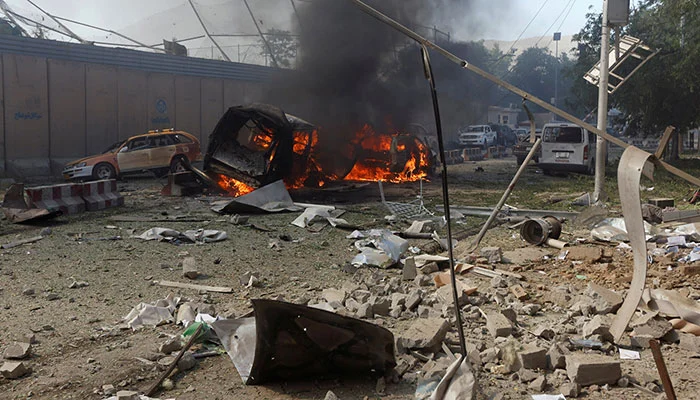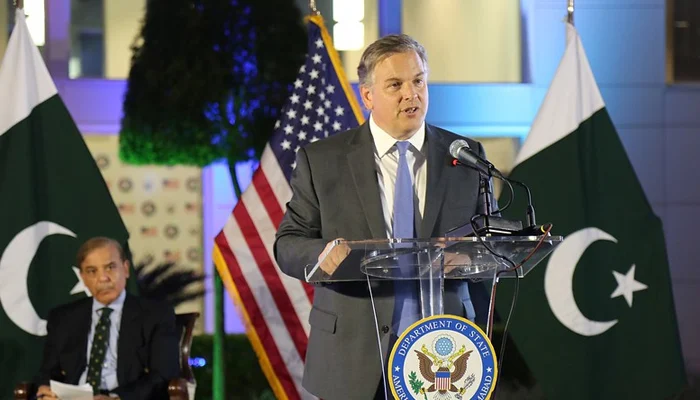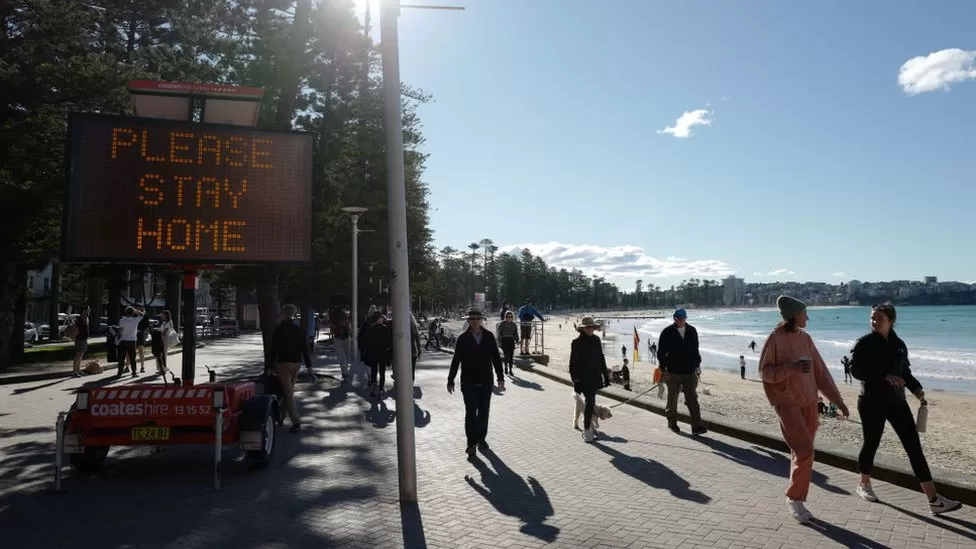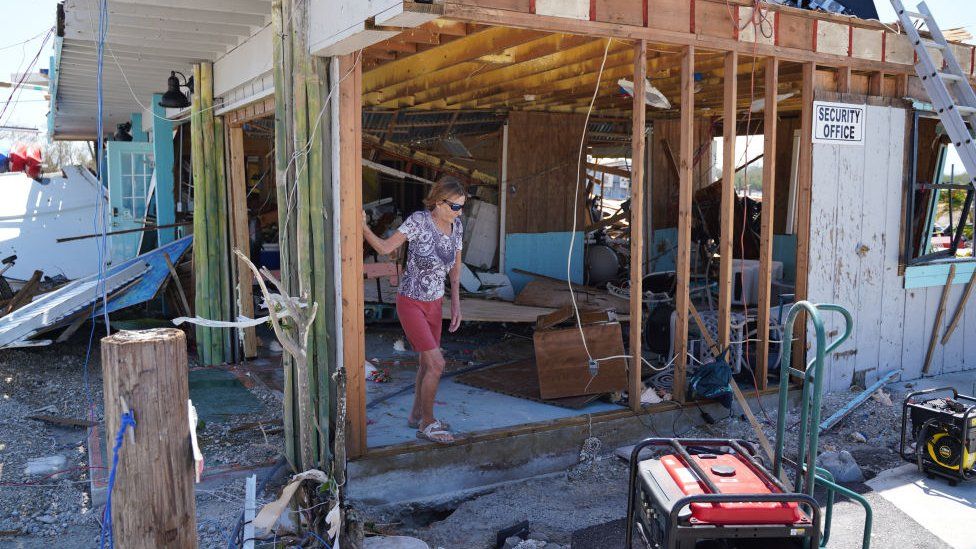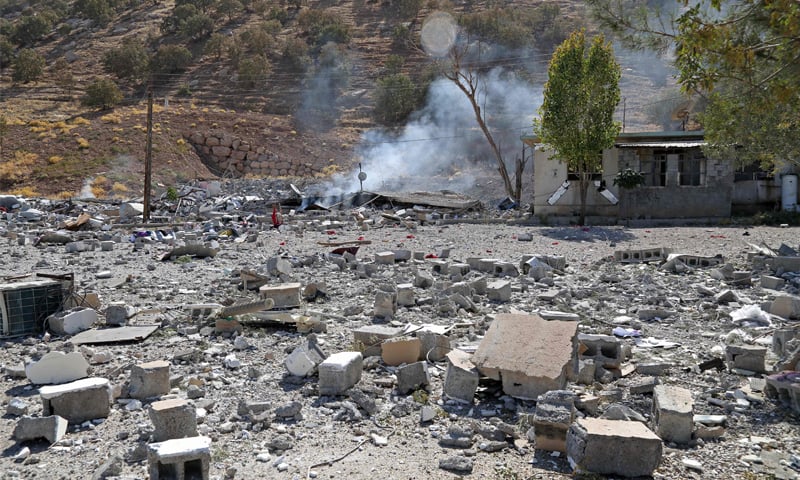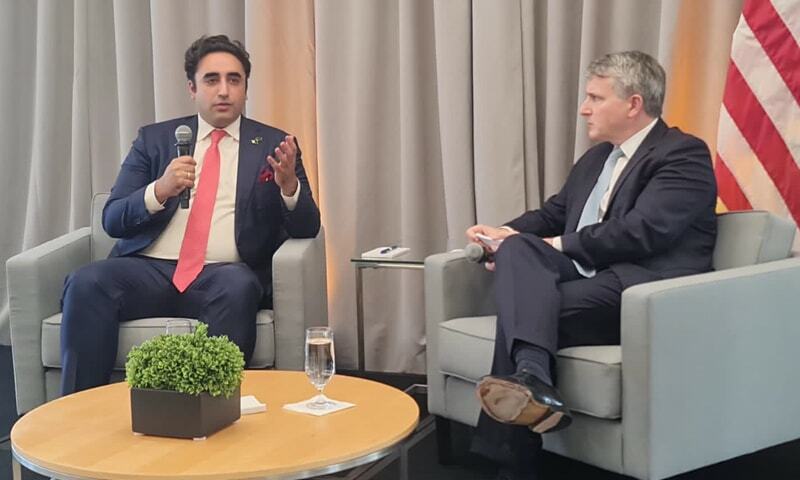ISLAMABAD: There is no truth in the regime change allegations, United States Ambassador to Pakistan Donald Blome said Thursday, terming PTI’s claims as “unfortunate“.
In an exclusive interview with The News and Jang, the ambassador said that the US enjoyed a long and very important relationship with Pakistan.
“We want to see an independent, prosperous and strong Pakistan. That’s what we believe is in our interest and in the interest of the region. As for the allegations, there is absolutely no truth in that.”
“The United States has spoken to them [Pakistain govt] here and in Washington. I am hopeful that we can get past this and back into the important work that we have to do, to work together on some issues right now facing the world and our two countries.”
Regarding the question on Washington’s oft-discussed demand for air bases in Pakistan, Blome responded: “I can tell you there were no discussions about air bases, one way or another.”
He also used the term “no discussions, at all, about the bases” since he assumed charge of the office in Pakistan.
“I am here for the last four months and this has not been an issue on my agenda. Our agenda here is pretty clear,” the ambassador said.
“It has to do with building and broadening economic, trade and investment relationships and working on climate change, which has obviously become a pressing issue right now besides working on energy transformation which is important for Pakistan and also for the planet.”
“In terms of security, both the countries have a strong relationship.”
On former premier Imran Khan’s demand to hold an inquiry into the cypher issue, Blome said: “So, it is not my position really to talk about whether the inquiry should be made or not.”
“I can’t speak on his statement. I don’t have too much to add. We don’t read out the routine diplomatic meetings. What I can say is certainly it’s the norm of diplomatic business of any ambassador, meeting here or in Washington”.
“To have these kinds of discussions about issues, whether we agree or not, it is a standard business of diplomacy. I think again it is really important for us to pass this right now”.
Answering a question about whether he has ever met the former premier, the ambassador told these scribes that he had not met Imran so far.
However, the ambassador also noted that the US would “absolutely” work together with any government that the Pakistani people choose — even if it is Imran comes into power again.
US concerns on Pakistan’s nuclear programme
To a question regarding concerns about Pakistan’s nuclear programme, the US ambassador replied: “Regional security is such an important issue right now for Pakistan, for its neighbours and the world.”
The US ambassador said the Joe Biden administration was committed to working with Pakistan, in any way, to reduce tensions and look for ways to resolve regional disputes peacefully.
“I think it is really important to look for ways to build confidence between the states and the neighbours. That certainly means to find ways to discuss the issues and try to find ways to resolve the incredibly pressing challenges.”
Blome said that the US has broad concerns about proliferation and it is working very hard and is committed to the non-proliferation principles to finding ways to reduce the threats of nuclear weapons around the world.
“It continues to be high on the agenda of the US administration. We had a good and open discussion with Pakistani authorities on a range of security issues, including those issues.”
Blome said the United States worked with Pakistan on nuclear issues in a variety of international fora.
“We worked with Pakistan directly in the IAEA. We participate together in global initiatives to combat nuclear terrorism. We worked together on UN efforts to prevent WMD proliferation. We just have to build strong blocks on those issues.”
Debt repayments
For assisting Pakistan after the cataclysmic floods, the ambassador said that the United States has given about $56.5 million in an initial UN appeal.
Blome said apart from that, recently, Secretary of State Antony Blinken announced an additional $10 million — particularly focused on food security that would go to seeds and fertilisers for farmers and repair of flood-damaged irrigation infrastructure.
The money that the United States has already disbursed, has been done through the UN agencies like UNDP, UNICEF and WFP, he said, adding that the US was working with several international NGOs as well.
On a question about a moratorium on debt repayments, the ambassador said: “We are certainly sympathetic to the need for Pakistan to find ways to deal with its deferred debts.”
“Pakistan doesn’t have an enormous amount of debt with the United States in particular. So, the Paris Club debt is a relatively small amount. It is how the US would be working with Pakistan to defer payments.”
“Our portion of the debt is small. Certainly, we want to help Pakistan to navigate this very difficult period”.
US doesn’t ask countries to ‘choose single economic partner’
The ambassador said it’s important to clarify that the US, in no way, asks Pakistan or any other country to “choose a single economic partner, bloc or anything else like that”.
“Now the important thing here is that we stress that international trade and investment should be based on international standards of transparency.”
“Frankly, the US and China have very complex economic relationships for many, many years but we want to ensure that our relationship with China is based on those principles of transparency and fairness and equal treatment.”
“I think that’s a question for Pakistan and it is not necessarily our issue but problems we have seen that have arisen in the region and the world where sustainability and debts have become an issue for many countries.”
“Again depending on that quality of investment and transparency, that’s I think, is a broad concern that we have in many places, not just here. The issue really is what kind of investment is being made in Pakistan.”
“Is it being made on a fair and equal basis? I think all investments being made here should be subjected to same scrutiny, whether it is American, Chinese or any other investment in Pakistan”.
Biden’s F-16 announcement
Regarding President Biden’s announcement that the US would supply F-16 parts to Pakistan, the US envoy said that the US-Pak relationship and engagement were very strong in terms of defence.
“We increased the pace of bilateral exercises. We did the Falcon Talon Exercise in March. We did the Inspired Union naval exercises in April.”
“We had eight naval ships visit last year to Pakistan. These are all signs of continued, strong relationships and cooperation with Pakistan.”
“Our training programmes remained very vigorous and strong for decades. The combined, joint maritime forces in the Arabian Sea patrolled together at the international waters to protect against pirates and terrorism.”
“Actually, Pakistan has commanded joint maritime forces 20 times more than any other country. Security partnership has broadly remained very strong in terms of defence transfers and security assistance that are continued on a case by case basis.”
“Where we are determined to serve the interests of both parties and we make an announcement regarding the F-16s. The F-16 programme is a long-term commitment, a long-term partnership. We want to help Pakistan to maintain and that’s what is represented in that (Biden’s) announcement.”
Blome praises Shehbaz govt
Moving on, Blome credited the government for securing the International Monetary Fund’s (IMF) deal and termed it a “significant accomplishment”.
The ambassador said now that Pakistan has secured the bailout package, it was important for the nation of 220 million to start its way towards self-sustainability.
“Having stable finances is a foundation for it but it is not sufficient. I think it is going to be important for Pakistan to find new ways to attract international investment here.”
“I think Pakistan should be in a conversation about shifting pattern of international trade right now.”


